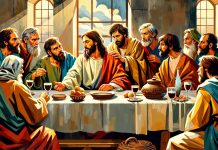Jesus’s unpredictability is one of His most memorable traits—one that was, however, not born out of an extraordinary speculative intelligence, but out of such a different perspective on reality that even the most trained and educated thinkers could not foresee it. Therefore, Jesus’s unpredictability says more about us than about Him.
When He went before Pilate, saying that He had come to “testify to the truth”, Christ revealed that His consistent, coherent, and foreseeable actions in the light of the Truth were unpredictable only because His listeners did not have the Truth as their reference point.
It is not Jesus who steps out of the ordinary with His reactions. It is we who lost the ability to understand the normality of His answers.
The apostle Paul strengthened this idea when he described the cross of Christ as “foolishness”. In fact, both Jesus’s life and His death are a source of continual consternation to the human mind. Moreover, we are constantly dismayed by the whole Bible, and we seldom accept that this speaks more of us than of the Bible.
In a previous article, where we talk about poverty and the suitable answers for it, I focus on the Bible’s position on money. It’s very easy to see how shocking this is overall. In short, by observing Mosaic regulations, the Jews came to donate about a third of their income for various purposes. But were the other two-thirds theirs? No, because according to the Bible, all material and financial resources belong to God by right, humans being only stewards, who must use them according to God’s plan.
In practice, so few have been able to understand and apply this universal principle. In the New Testament, Jesus goes so far as to say that it is easier for a camel to go through the eye of a needle than for a rich man to enter the kingdom of God.
From the Bible’s point of view, human efforts to establish mathematical and moral guidelines that guarantee an innocent independence in the management of one’s own wealth are the result of a wrong approach. We are the stewards of God’s property and the right target is not our independence from Him, but the acceptance of His sovereignty. Freedom does not mean deliverance from God, but deliverance through God. The Bible connects the latter not only to salvation but also to our happiness.
God’s sovereignty does not entail our arbitrary submission, but our integration into a higher way of thinking, into the Sovereign Truth of God. Through our openness to the Truth, we discover the happiness that lies in living according to the dimensions of the Truth. Some may attempt to prove otherwise (the Bible says that Lucifer tried to do this), but these are the stakes of biblical religion—will humans continue to fight against God’s bewildering truth? Or will they seek to understand His reasons and be transformed and set free by Him?
We must recognize that, while the end of such a process promises freedom, its beginning requires faith. Only by faith can one begin to explore God’s bewildering truth without prejudice and preconceptions.




















